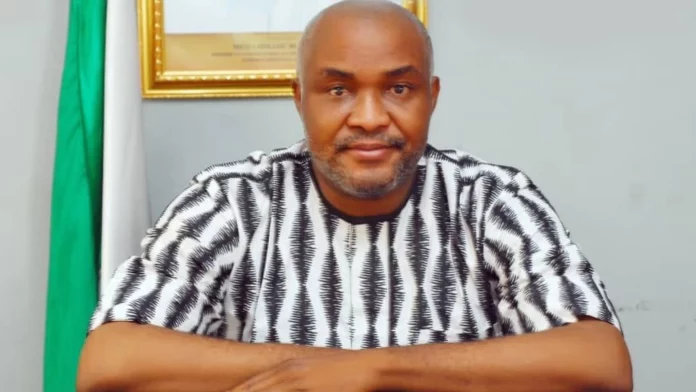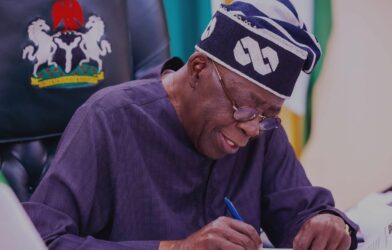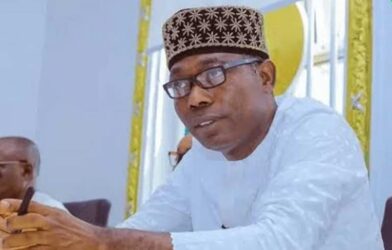11
“Medice, cura te Ipsum” (‘Physician, heal thyself’, Luke 4:23).
The word ethics is generally understood to be a set of “moral principles that govern a person’s behavior or the conducting of an activity.” Ethics is also defined as ” the branch of knowledge that deals with moral principles”.
In my high school days, ethics or codes of conduct for students were a set of rules that each student must abide by meticulously or be liable to a certain degree of corporal punishment. For instance, every student was expected to be physically present at the early morning assembly before 8 am, and failure to show up means you would undergo some form of sanction or the other. In my high school then known as Teachers College Kafanchan, a discipline master is a part of the workforce that was responsible for meting out these corporal punishments such as apportioning a part of a field overgrown by weeds for the offending student to weed out and clean up.
In the context of what we have set out to discuss, ethics are subsets of rules or operational codes of conduct or a set of rules which binds members of a professional group and in this case we are dwelling and zeroing in on the Nigerian judiciary. It is therefore expected that just like a set of bylaws that these codes are for justices and judges of all courts of record encapsulated in section 6 of the Constitution of the Federal Republic of Nigeria of 1999, as amended, any Judge found wanting ought to be made to face administrative sanction or censure.
The fundamental objectives of establishing ethical codes that are binding on members of any professional group and especially the judiciary of Nigeria as the subject matter of our conversation is, derives legitimacy from the expectations of the citizens of Nigeria that members of the Nigerian judiciary being men and women who are ministers in the temple of justice, are like Ceaser’s wife, should live above board.
The ability and competency of the hierarchy of the judiciary to enforce these ethical codes, is the automatic license for the judiciary to be judged as maintaining a commendable level of integrity, credibility, and adherence to the set out rules by members of the the Judicial profession. Legal Practitioners in Nigeria do also have a body charged with the duty of disciplining erring members of the legal profession including inflicting the harshest punishment of disbarment or dismissal from holding the practicing licence as a lawyer in all of Nigeria.
Speaking about ethics in relationships with the judiciary of Nigeria, the conversation has become a talking point and there is already a groundswell of perception by majority of the discerning public that there is a sickening level of deterioration of the observance of the ethics of the judiciary by many judges. There is a clearly disturbing perception in the court of public opinion that some of the decisions reached by some of the judges of the competent courts of law in Nigeria including the Supreme Court of Nigeria have been anything but competent, credible, coherent and therefore questionable.
Besides, it is generally believed that the failure of the relevant body within the judiciary and most especially the national judiciary council to reign in several members of the temple of justice found wanting of breaching the ethics of the judicial profession has contributed to the growing public distrust in the integrity of the courts.
Even the Chairman of the National Judicial Council who is the head of the judiciary in Nigeria or otherwise known as the chief justice of Nigeria has acknowledged that there is are disturbing levels of violations of code of ethics by some judges. However what do we say to somebody clothed with the legal authority to deliver discipline to the erring members of the judiciary but yet kept verbally bemoaning the decline in the observance of these ethical codes? We will say to the Chief Justice of Nigeria: PHYSICIAN, HEAL THYSELF.
The charge on the head of the judiciary and the heads of courts to take actions to fix the broken system is increasingly strategic especially now, with the widespread attacks that the judiciary is receiving from a lot of Nigerians on the issue of extensive corrupt practices, and we make haste to throw this well conceived question thus: why has the judiciary of Nigeria not been able to deal with corruption?
Also, why is it that despite the general uproar and public disapproval regarding the unacceptable friendship between judges and politicians who are mostly political litigants, these unethical behaviors have yet to abate? Yet, even when occasion arises for the Chief Justice of Nigeria to make a good example with one of the alleged indicted justices or judges, there is a yawning gap and what we get is a head of the Nigerian court system who keeps complaining during public events but fails persistently to wield the big stick.
A few months back, even the current chief justice of Nigeria, kudirat kekere-ekun personally attended social event hosted by the Lagos state governor and was also a key guest of honour of the foundation laying ceremony by the federal capital territory ministry of the free houses for judges and Justices to be donated by the executive arm of government. These occasions are such that the ethical codes of conduct for judges forbid because for the head of the court system in Nigeria to attend such events by the executive arm of government headed or coordinated by individuals who are prolific political litigants such as the minister of FCT Nyesom Wike and the Lagos state governor, then most Nigerians would draw the conclusion that the impartiality of the judicial arm of government in cases instituted by these individuals or their political surrogates against their political adversaries is not guaranteed. The fact is that Nyesom Wike is known for backing some 27-members of the Rivers State House of Assembly who parted ways with the governor leading to impeachment threats at the directive of the FCT minister who then backed dozens of cases in courts that ended up in the Supreme Court of Nigeria and ultimately decided in the minister’s favour.
This kind of public show of shame also happened in the immediate past dispensation when the immediate past chief justice of Nigeria was similarly seen on television praising the then government of Rivers State, who incidentally is the Minister of FCT, mentioned virtually in most of the controversial social interfaces between key players in the judiciary. The most recent is the appearance of Justice Emmanuel Agim alongside the Minister of FCT at the convocation ceremony of the University of Calabar.
It would be recalled that Justice Emmanuel Agim, the Supreme Court justice, was the presiding head of a panel of five justices of the nation’s apex court that prepared and read the highly controversial judgement against governor Siminalayi Fubara, who is an estranged political godson of the Minister of FCT. Agim’s toxic judgment has catapulted Rivers state into the current unconstitutional and illegal proclamation of a state of emergency and the equally unconstitutional suspension of Governor Fubara by President Bola Ahmed Tinubu who publicly took sides with his minister of FCT Mr. Nyesom Wike.
This public appearance of justice Agim and Minister Nyesom Wike in Calabar has reignited a whirlwind of controversy regarding adherence to ethics by justices. The optics from that widely publicised event is a direct violation of rule 1 of the Ethical codes governing judges and justices in Nigeria. That rule 1 speaks to the thematic issue of “Propriety and the appearance of propriety, both professional and personal”. The rule 1 states as follows: 1.1 Propriety and the appearance of propriety, both professional and personal, are essential elements of a Judge’s life. As members of the public expect a high standard of conduct from a Judge, he or she must, when in doubt about attending an event or receiving a gift, however small, ask himself or herself the question- “How might this look in the eyes of the public?”
1.2 A Judge shall avoid impropriety and the appearance of impropriety in all of the Judge’s activities both in his professional and private life.
1.3 A Judicial Officer should respect and comply with the laws of the land and should conduct himself at all times in a manner that promotes public confidence in the integrity and impartiality of the Judiciary.
1.4 The Judge must be sensitive to the need to avoid contacts that may lead people to speculate that there is a special relationship between him and someone whom the Judge may be tempted to favour in some way in the course of his judicial duties.
1.5 A Judicial Officer must avoid social relationships that are improper or may give rise to an appearance of impropriety or that may cast doubt on the ability of a Judicial Officer to decide cases impartially.
1.6 A Judge shall not hold membership in any organization that discriminates based on race, sex, religion, ethnicity, national origin, or other irrelevant cause contrary to fundamental human rights and/or the Fundamental Objectives and Directive Principles of State Policy under the Nigerian Constitution.
1.7 A Judge shall not engage in gambling as a leisure activity.”
Reading through this aforementioned section of the ethics of codes of conduct for judges and justices of the Nigerian judiciary, we will then ask why the Supreme Court was quick to defend Justice Emmanuel Agim instead of using internal ethics investigation mechanism to probe the controversy that emerged from the alleged public display of friendship between Justice Emmanuel Agim and Honourable minister of FCT Nyesom Wike as may be interpreted from media coverages and the pictorial. This is why most media contents analysts dismissed as hypocritical the bemoaning of a decline in adherence to ethical principles by judges as expressed by the CJN.
The Chief Justice of Nigeria CJN, Justice Kudirat Kekere-Ekun on Wednesday was quoted by reporters to have taken a critical look into the practice of law in the country and lamented the downturn in adherence to ethical principles in the legal profession.
She noted with regrets that strict adherence to ethical principles in the legal profession was not only dwindling but facing serious challenges.
The CJN spoke at the public presentation of the report of the Directions of the Legal Practitioners Disciplinary Committee held at the Body of Benchers Complex in Abuja.
To address the trend, Justice Kekere-Ekun canvassed an urgent need for law practitioners to recommit themselves to the fundamental values of ethics, discipline and professional responsibility.
She said, “It is instructive to note that the Body of Benchers, as the apex institution of the legal profession in Nigeria, is uniquely positioned to lead the charge in this regard.
“The responsibility of upholding the legal profession’s sanctity rests heavily on its shoulders, and I do not doubt that the body will continue to rise to the occasion.
“The enforcement of professional discipline among legal practitioners, through the Legal Practitioners Disciplinary Committee (LPDC), is a vital function that must be pursued with fairness, transparency, and unwavering resolve.”
The CJN who chaired the inaugural edition of the Body of Benchers’ annual lecture and the public presentation of the Body of Benchers Law Report, praised the Chairman of the Body of Benchers, Chief Adegboyega Solomon Awomolo, SAN, and the entire members of the Body for their foresight and dedication in initiating the lecture.
The CJN should know that Nigerians are simply jeering at her for presenting the image of a head of the court system who is suddenly overwhelmed and incapable of wielding the big stick against the increasing numbers of judges and justices that are dragging the judiciary to the muds of infamy. The chief justice of Nigeria has admitted that this is a problem. Why is she unwilling to step up the fight through transparent actions to deal decisively with wayward justices and judges rather than inundate Nigerians with empty and hypocritical lamentations?
Emmanuel Onwubiko is the founder of the HUMAN RIGHTS WRITERS ASSOCIATION OF NIGERIA















Comments are closed